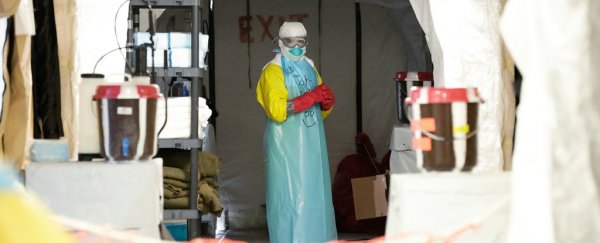As another outbreak of Ebola claims lives in central Africa, researchers are seeing within it a rare ray of hope: a chance to find a cure.
For the first time, five experimental medicines are poised to undergo a real-life clinical trial against the virus at makeshift treatment centers in remote areas of the Democratic Republic of Congo, where most of the 53 new cases originated.
The country's health ministry cleared all the treatments for use as of Monday.
Hundreds of vials of drugs in development by Gilead Sciences Inc., Regeneron Pharmaceuticals Inc. and others are on their way or in place.
Some have only been tested on animals and a handful of healthy volunteers, and none have been proven to work against the severe viral disease in a standard clinical test.
Now, scientists are seeking a way to offer compassionate treatment for patients with few options while doing painstaking data collection to evaluate the drugs.
Health officials have already begun using an experimental vaccine, donated by US drugmaker Merck & Co., in hopes it will protect people who may have been exposed to infection.
The efforts could yield the first-ever weapons against a disease that has no cure and kills about half of the people it infects. At least 25 deaths have been confirmed from this outbreak.
"There's a consensus that we really need to move forward," said Vasee Moorthy, an infectious diseases doctor at the World Health Organization who coordinated vaccine research during the last Ebola epidemic.
"We hope that by the end of this outbreak we gradually have more information about which drugs provide benefits to patients."
The obstacles are steep. Normally, researchers test an individual drug against a placebo, but they'd forego it in this case for ethical reasons.
They must also devise a way to randomly assign patients to various treatment groups while taking into account individual medical needs and watching for side effects.
Carrying out a trial that pits multiple untested medicines against one another would be challenging in the best of conditions.
This one would take place in an impoverished, equatorial nation of 78 million that's home to the river that gave Ebola its name and much of the world's second-largest tropical forest.
Drugs will need to be shipped by riverboat, on unpaved roads or by helicopter to overcome a lack of infrastructure inland. Some must be kept cold in the hot, humid climate.
'Learn Now'
"This is no simple piece of work," Peter Salama, WHO deputy director-general of emergency preparedness and response, said at a briefing in Geneva last week. "But if we don't learn now, then we'll never know which are the better drugs to use."
One of the medicines, called ZMapp, has been through another potential pitfall of testing experimental treatments during a public-health crisis.
Because it was only tried toward the end of the last Ebola outbreak - just as international aid agencies were getting the contagion under control - it wasn't given to enough patients to reach conclusive results.
That epidemic, the largest in the disease's history, ended in 2016 after killing more than 11,000 people in West Africa.
Still, the drug showed promise. Eight of 36 people who took it died, compared with 13 of 35 who had standard care alone.
Larry Zeitlin, president of closely held Mapp Biopharmaceutical Inc., which developed the treatment with the US and Canadian governments, said the need for clinical data must not eclipse treatment priorities.
"The goal is to provide it for compassionate use," he said by telephone. "You obviously don't want to compromise the public health process by being too concerned about a clinical trial."
Three other medicines found suitable by a group of independent experts assembled by the WHO and cleared by the DRC's health ministry are Gilead's antiviral remdesivir; a Regeneron cocktail of three monoclonal antibodies known as REGN-EB3 that's only been tested in healthy people; and the antiviral Favipiravir, made by Japan's FujiFilm Corp., that's already sold to treat influenza and was used in the West African outbreak.
Fujifilm said in an email that a mechanism to study its drug's effects in Ebola patients in the DRC "should be constructed."
Gilead shipped 360 doses of remdesivir to the DRC on May 28. The intravenous drug, which requires monitoring of liver and kidney function, has been used just twice in Ebola patients.
It has been tested in healthy volunteers and is now in trials in Ebola survivors, according to a Gilead spokeswoman. Regeneron completed a single test of its drug in healthy patients last year, and hasn't published the results.
Gilead said the DRC's Institut National de Recherche Biomédicale in Kinshasa would distribute its drug for emergency treatment.
Another experimental treatment, an antibody against Ebola isolated from a survivor of the 1995 outbreak in the DRC and developed by scientists at the US National Institute of Allergy and Infectious Diseases, was also approved for use.
Clinicians will evaluate patients on a case-by-case basis to determine their eligibility for receiving the drug candidates, said Jess Ilunga, a spokeswoman for the DRC's health ministry.
Doctors Without Borders and other aid groups with emergency facilities will likely handle treatment. The DRC's national research institute will help collect and collate the data, backed by the WHO, and drugmakers are supplying their treatments for free, according to Moorthy.
"Treating Ebola patients in DRC is tough enough logistically, but to also collect clinical and laboratory data in a rigorous way requires significant cooperation and effort from drug developers, regulators and global health partners," said Alexandra Bowie, a spokeswoman for Regeneron.
"The good news is that everyone is committed to gathering this data so we can be better prepared and organized for future outbreaks."
2018 © Bloomberg
This article was originally published by Bloomberg.
